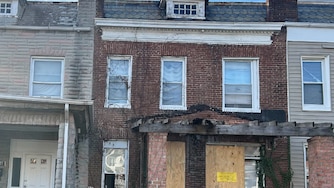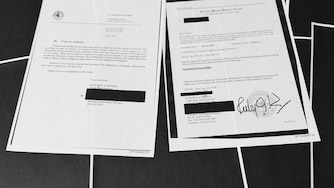A man has died after suffering a medical episode at the Baltimore Central Booking and Intake Center, the city jail that has been under decades-long court supervision over its health care system.
Trayvon Ocain, 33, of Baltimore, was pronounced dead at Mercy Medical Center on New Year’s Day, according to his family members, who said they have still not received an explanation of what happened from jail officials at the Maryland Department of Public Safety and Correctional Services.
Loved ones said they first heard of Ocain’s death from other people incarcerated at the facility, who told them that he suffered a medical episode of some kind and that other detainees’ cries for help were at first ignored by correctional officers.
In a statement, the corrections department confirmed the death and said the facility’s chaplain “personally notified the family.” The agency, the statement read, “remains committed to providing transparency as we await the autopsy results and continue the investigation.” That process could take weeks or months.
Ocain’s cousin said the family called the facility after hearing about the death and only then spoke to the chaplain, sometime around 8 p.m. or 9 p.m. that evening.
“I want everybody to be held accountable for what they did to him,” Trina Ocain, Trayvon Ocain’s cousin, said on Thursday evening. “He had a baby, a 1-year-old. This is not fair. This could happen to somebody else.”
Trina Ocain heard different accounts about what happened: Some people said her cousin suffered a heart attack, while others reported he experienced a seizure. She said she heard from someone else that Trayvon Ocain ate a meal, coughed loudly, and then lay across a table, complaining that he couldn’t breathe.

At first, correctional officers didn’t take his complaints seriously, according to accounts from other people incarcerated at the facility told to family members. They also circulated social media posts alleging neglect.
“They put him up in the lobby, all the inmates were hollering, going crazy, calling for them to help him,” Trina Ocain said about what she heard from the accounts of incarcerated people. “The COs started doing CPR, Trayvon was spitting up.”
The family is concerned that Trayvon Ocain was complaining of medical issues for hours before being taken to the hospital. But the corrections department pushed back, reporting that staff “responded to a medical emergency” at 4:08 p.m. and that Trayvon Ocain left the jail for the hospital at 4:52 p.m.
“Despite the efforts of medical professionals,” the corrections department said in its statement, Trayvon Ocain was “pronounced deceased shortly after.”
Trina Ocain said that timeline matched with her own. That’s because Mercy Medical Center reported receiving her cousin shortly after 5 p.m. But she emphasized that Trayvon Ocain first started experiencing medical issues shortly before noon, according to other people incarcerated at the jail. The state corrections department did not immediately respond to follow-up questions about the timeline.
The health care system at Central Booking is under close scrutiny as part of a decades-old civil rights lawsuit that challenged whether medical care and mental health services in city jails met constitutional standards.
The corrections department, which has struggled to come into compliance with the terms of an 8-year-old settlement agreement in the case, recently hired a new medical provider to oversee health care at the jail: Centurion Health, which previously provided only mental health services.
An arrest driven by surveillance
Trayvon Ocain landed in jail last May after being charged with illegal possession of a regulated firearm and related offenses.
A Baltimore Police detective was watching a city surveillance network when, at about 3 p.m., he zeroed in on a man at the intersection of East Monument Street and North Curley Street, on the border of Ellwood Park/Monument and Madison-Eastend in East Baltimore.
Detective Matthew Banocy said he saw a man lifting up his T-shirt and looking down at his waistband. The man, police allege, then grabbed his waistband and pulled it up.
Later, Banocy asserted, he saw a large object move in the front of the man’s pants.
Banocy claimed those movements were “characteristics of an armed person” — so he relayed his observations to the Southern District Action Team, or DAT.
Law enforcement summoned Foxtrot, the police helicopter.
Police eventually took the man into custody on North Kenwood Avenue, between East Madison Street and Ashland Avenue. Detectives reported that they found a Polymer80, a weapon without a serial number that’s commonly referred to as a ghost gun.
The gun, police alleged, was loaded with one cartridge in the chamber and six in the magazine. Law enforcement claims they also found a folding knife and Suboxone on him.
Trayvon Ocain was not allowed to own a gun because of several prior convictions.
He was set to stand trial on Thursday before Baltimore Circuit Judge Paul J. Cucuzzella, according to court records. The case was abated by death, said Emily Witty, a spokesperson for the Baltimore State’s Attorney’s Office, in an email.
Trina Ocain said the family went through additional anguish attempting to get Trayvon Ocain’s body transferred from the medical examiner’s office to a funeral home in the midst of a snowstorm. His mother was not able until Wednesday to identify her son.
Said Trina Ocain: “They treated him like he wasn’t nobody’s child.”




Comments
Welcome to The Banner's subscriber-only commenting community. Please review our community guidelines.